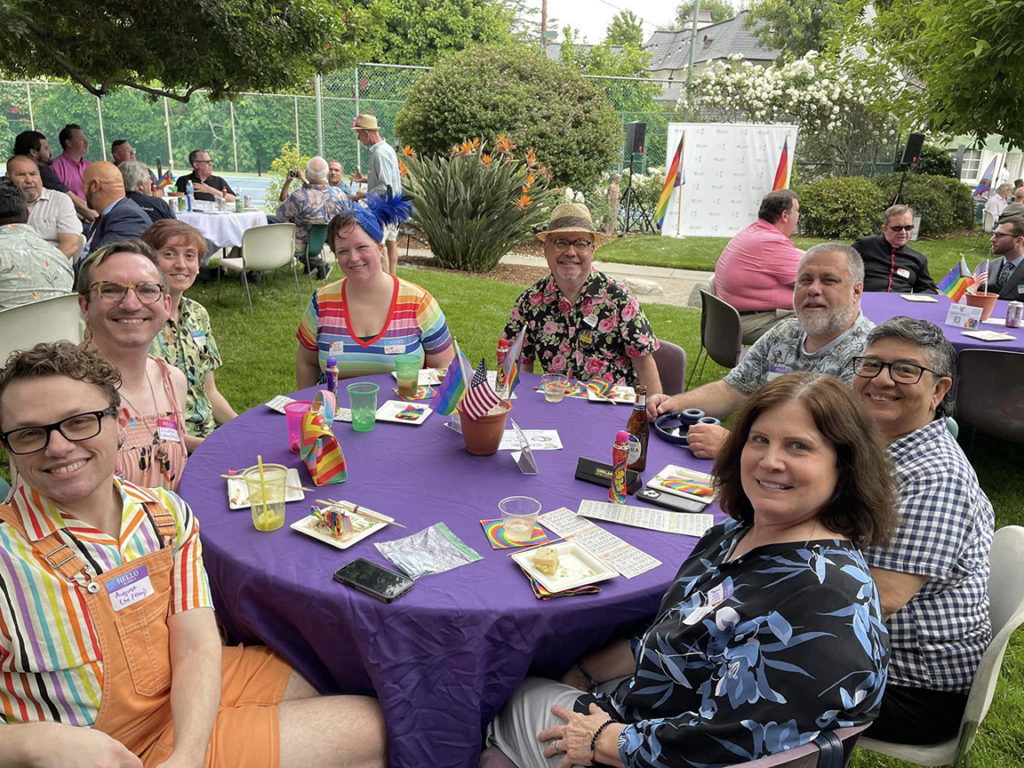
Guests of GLEAM, the diocese’s LGBTQ+ ministry, enjoy the organization’s annual garden party at the episcopal residence on May 21. Photo: Susan Russell
[The Episcopal News] The light of Christ outshines the “considerable challenge that we face when red-blue polarities are growing deeper and more profound all the time,” Bishop John Harvey Taylor told those gathered for the May 21 annual GLEAM garden party affirming the Episcopal Diocese of L.A.’s LGBTQ+ members and ministries.
“Our faith is that the darkness will never overcome the light,” Taylor said, borrowing a metaphor from the afternoon’s cloudy shadows and occasional raindrops that dappled the lawn of the episcopal residence in Pasadena, to which he and his spouse, Canon Kathy O’Connor, welcomed the 80 guests on hand.
Noting that GLEAM – an acronym for “Gathering LGBTQ Episcopalians in Active Ministry” – is at work against a backdrop of recent expressions of transphobia and corporations dialing back prior LGBTQ solidarity, Taylor pointed to the Dodgers’ exclusion – since reversed – of the Sisters of Perpetual Indulgence from the stadium’s Pride Night in Chavez Ravine.
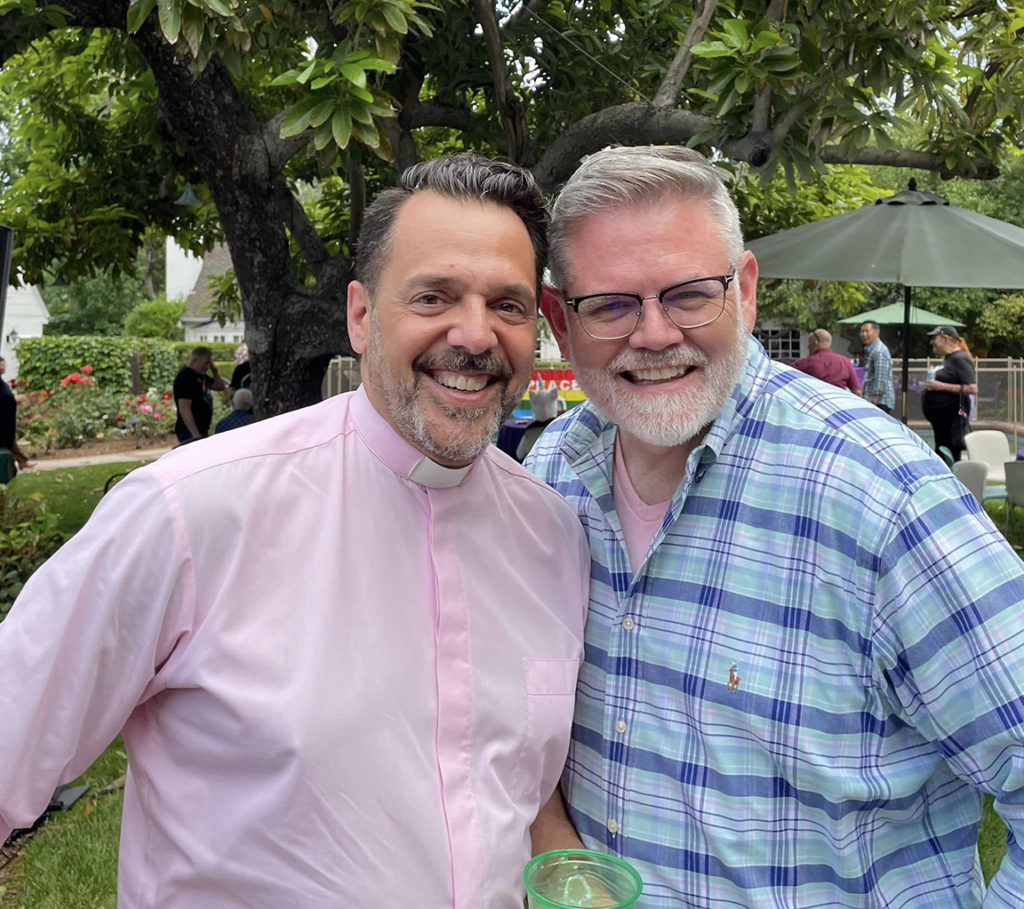
Christopher Montella, left, GLEAM chair, and his husband, Erick Long, enjoy the festivities. Photo: Susan Russell
The Very Rev. Christopher Montella, chair of the Bishop’s Commission on LGBTQ Ministry, and the Rev. Canon Susan Russell, diocesan canon for engagement across difference, also underscored the timeliness of this year’s solidarity and ongoing advocacy.
“I think it was particularly important that we gathered this year both to celebrate how far we’ve come and to organize for how much work there is yet to do,” said Russell, who also, at the denominational level of The Episcopal Church, chairs its Task Force on LGBTQ Inclusion – a General Convention interim body, serving a five-year term through 2027.
“It was gratifying to me to see the broad diversity of both the diocese and the LGBTQ community represented, and part of the work ahead of us is increasing that diversity as we more fully become the beloved community we aspire to be.”
Montella agrees. “There can be no doubt that there is an assault on LGBTQ rights especially in the trans community, and our work is as vital as it ever has been…. We are called to stand with and for the vulnerable among us, and that demands that those of us who have privilege leverage our privilege to stand in solidarity with and advocate for those who do not.”
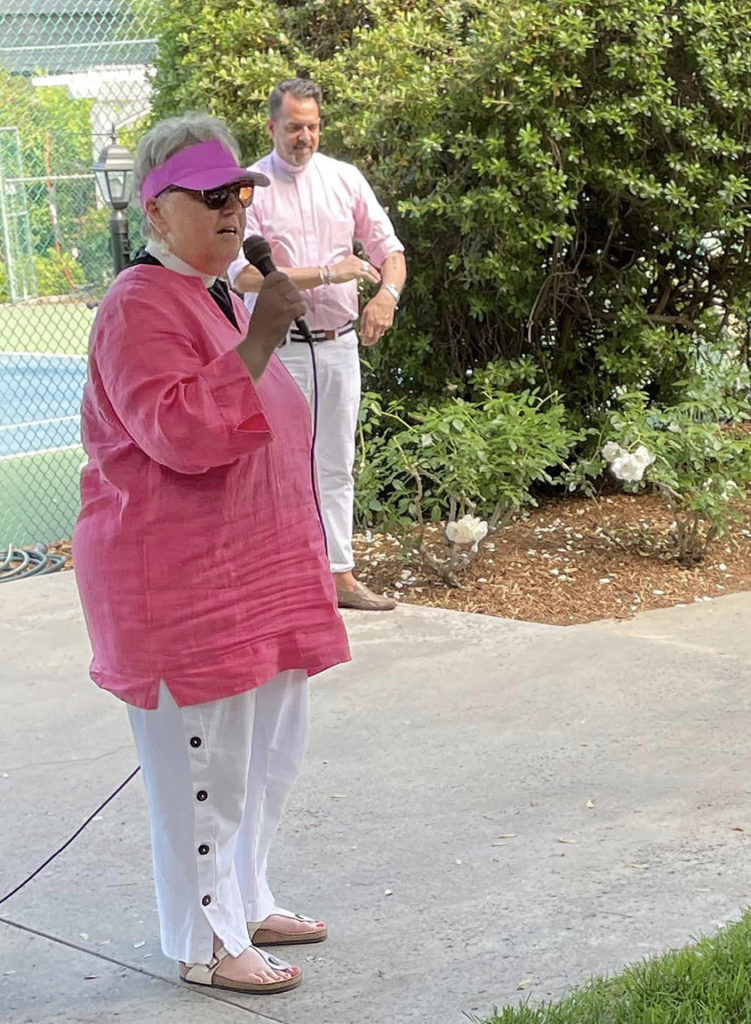
Canon Susan Russell leads assembled guests in a rendition of “Happy Birthday To You,” recorded for Canon Jim White, who was out of town. Photo: Courtesy of Susan Russell
He cited new “traction” in the reconstituted commission’s work and pointed to the significance of this year’s garden party adding “Drag Bingo” to the festivities at a time when drag performers around the nation are being restricted. “It felt very life-giving to celebrate drag in the context of the event,” he said.
Montella added the importance of “supporting financially the work of GLEAM and the diocesan contingent in this year’s Hollywood Pride parade June 11,” which will be joined by the Rt. Rev. Katharine Jefferts Schori, former presiding bishop of The Episcopal Church. (See related story here.)
Sandra Martinez, lay leader at St. Paul’s in Pomona – one of some 30 congregations represented at the garden party – said the event was a “great time of coming together after the isolation of Covid, and to hug beloved Episcopalians. I look forward to many more such gatherings, and I am blessed to be a part of GLEAM.”
Under the theme “You Are Loved,” the party also featured three onsite “pride poets” from rentpoet.com who, “as they were chatting with guests, started typing poems written in response to each conversation,” Montella said.
Another “fun aspect” included Russell leading attendees in singing “Happy Birthday” to Canon Jim White, 75, longtime commission member, creating a video to be sent to him in Puerto Vallarta where he resides part-time.
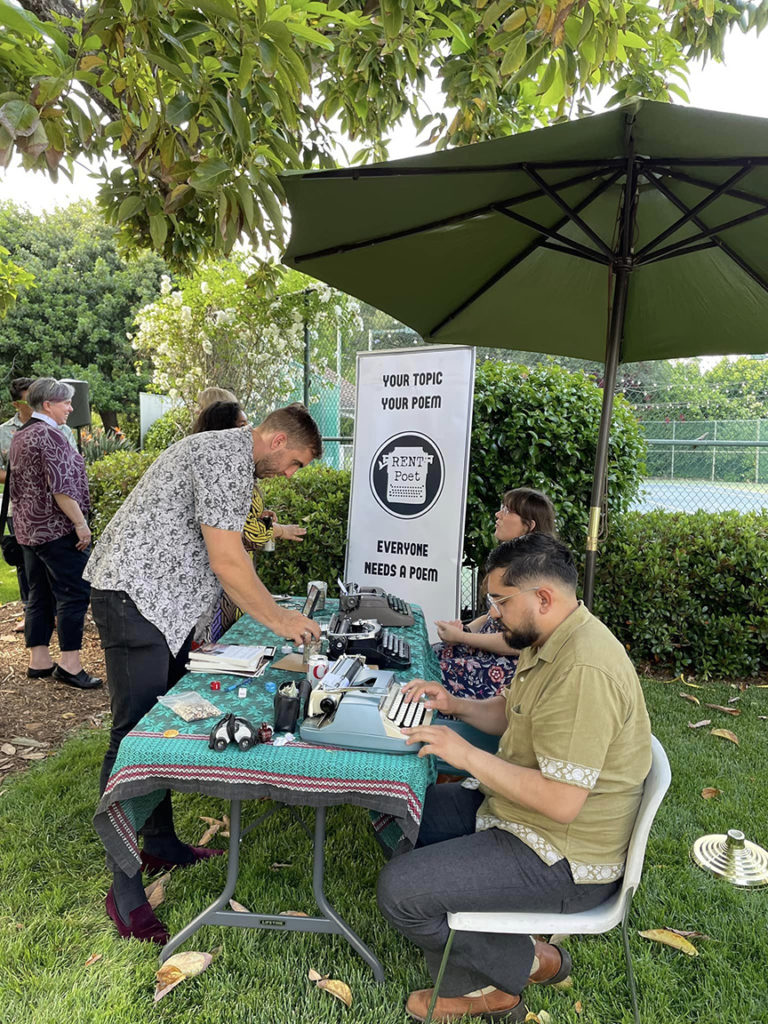
Professional poets help GLEAM party-goers create original poetry. Photo: John Taylor
Montella thanked Taylor and O’Connor and volunteers, underscoring “the importance of ally-ship and what a great model it was for us to gather at the bishop’s house for this event. … I can’t overstate what it means to have this kind of support from our bishop. … it goes beyond what words can say, and it models for the church something that is really quite powerful.”
In his remarks, Taylor thanked Montella, noting that “Christopher has singled out all of those who’ve worked hard to make this event happen; yet none has worked harder than Christopher,” and O’Connor paid tribute to Montella’s husband, Erick Long, for his leadership and assistance in coordinating the celebration.
Taylor also thanked Russell: “She brings laughter and wisdom to diocesan circles, and she is in very many ways one of the great prophets of equity in The Episcopal Church and in the Christian Church…. She brings a willingness to compromise, a willingness always to be in dialogue with people whose points of view have been if not odious at least dispiriting to hear, always willing to be in relationship and in conversation, because that’s the way the arc of history gets bent bit by bit.”
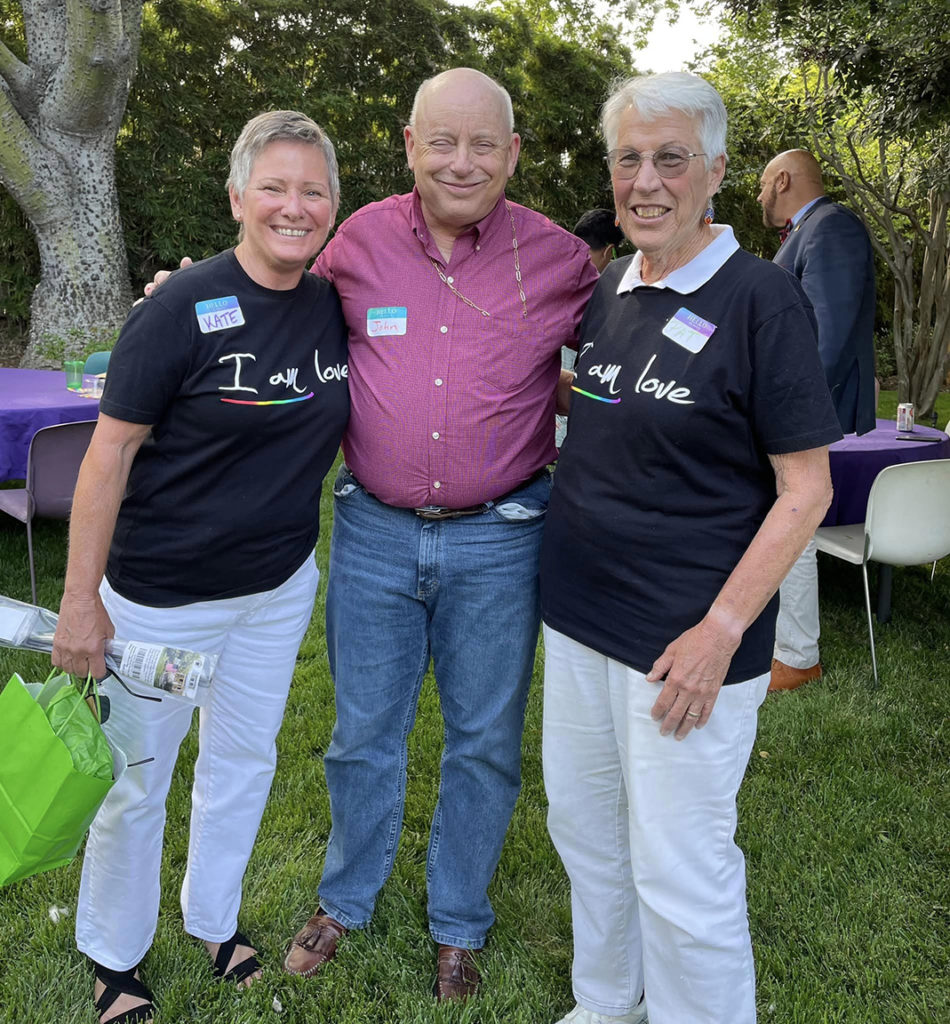
Bishop John Harvey Taylor greets clergy couple Kate Lewis, left, and Pat Hendrickson. Photo: Susan Russell
The bishop then turned to the morning’s I Peter epistle reading, which “speak out of a time when the church was persecuted for standing up for Christ, warning that those who proclaim the name of the Risen One will suffer. As people of privilege … we tend to hear these writings in the New Testament as being about the suffering people experience from injustice, chronic pain, illness, or loss. But the passages are very specific: they say that you will be persecuted if you stand up for the love of Christ.”
“Many of our fellow Episcopalians are understandably tempted to give in to pessimism about the future of our little sliver of Christendom, which proclaims the resurrection of Christ, which practices the ancient sacraments of baptism and the body and blood, and which, at long last, insists there shall be no bar to full equity in civil society or the church based on national origin, race, orientation, or identification,” Taylor said.
“If Episcopalians feel overlooked and judged and disrespected and underrated, the New Testament predicted it. I stress these things because it’s not going to be an easy, short struggle,” Taylor added, referencing wars and threats of wars abroad. “Against human freedom around the world, against equity and inclusion, darkness always gathers; darkness always impends.”
Thanking the partygoers for their courage and witness, Taylor concluded, “You and this church are absolutely vital to American Christianity; without Episcopal-Anglican expression, Christianity in this country slips closer and closer to the shadows of heresy. Our best years are ahead, and you are our pioneers.”
